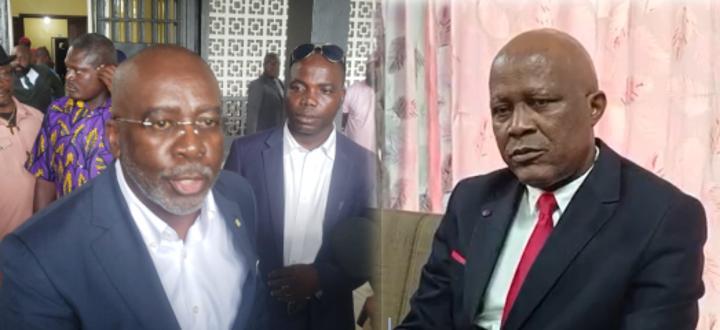Africa-Press – Liberia. The Ministry of Justice has moved to re-arrest several high-profile defendants in the Capitol Building arson case, claiming that the bail bond which secured their release is fundamentally defective, grossly inadequate in value, and violates Liberian legal requirements.
The legal action, now before the Monrovia City Court, is unfolding at a time when the Central Bank of Liberia is intensifying regulatory reforms to address widespread concerns over bond issuance and accountability in the country’s judicial system.
The defendants, who include lawmakers such as Representatives Dixon W. Seboe, Abu B. Kamara, ex-Speaker J. Fonati Koffa, Prescilla Cooper and Jacob C. Debbie, are facing serious charges of arson, attempted murder, criminal conspiracy, and illegal possession of firearms.
These charges stem from a catastrophic fire that engulfed portions of the Capitol Building December 2024, causing extensive damage and prompting public outrage.
In its petition, the Ministry of Justice asserts that the property bond filed on behalf of the accused, valued at US$441,863.50, is not only insufficient but fails to meet statutory requirements. Under Liberian law, bonds in cases involving property damage must amount to at least 1.5 times the estimated value of the loss. With the total damage to the Capitol Building placed at US$8.67 million, the bond should legally amount to no less than US$13 million.
Lead prosecutor Cllr. Bobby F. Weetol Livingstone criticized the quality and legitimacy of the documents presented in support of the bond. “The bond lacks essential documentation, including verified titles, valuation reports, and property photographs,” Cllr. Livingstone said. “Mere claims are not proof.”
“The Prosecution excepts to the Criminal Appearance Bond filed by Defendants Dixon W. Seboe, Abu B. Kamara, J. Fonati Koffa, and Jacob C. Debbie, and prays Your Honor to set aside the said bail bond for the following reasons: That the bail bond filed by defendants Dixon W. Seboe, Abu B. Kamara, J. Fonati Koffa, and Jacob C. Debbie, is encumbered, insufficient and it fails to meet the legal requirements for the sufficiency of a bail bond under Liberian Law.” – Prosecution’s exception to defendants’ bail bond
According to the prosecution, some of the properties listed were suspiciously overvalued, improperly verified, or entangled in unrelated legal claims. One case cited involved vacant farmland which was allegedly appraised at US$83,000, even though government tax records reflect an annual liability of only US$271.
Prosecutors also pointed to unpaid property taxes, questionable ownership claims, and potential duplication of the same properties in multiple unrelated bond filings as further evidence of irregularities.
The Ministry’s petition calls on Stipendiary Magistrate Ben Barco of the Monrovia City Court to nullify the bond and order the immediate remand of the defendants at the Monrovia Central Prison until a new, lawfully sufficient bond is secured and approved by the court.
The latest legal action coincides with a regulatory push by the Central Bank of Liberia, which in May 2025 issued Directive No. CBL/ID/DIR/001/2025, aimed at reforming and tightening standards for court bond issuance in Liberia. While the current case involves a property bond rather than an insurance-backed bond, the controversy highlights the growing national scrutiny around the use and abuse of bond systems in criminal proceedings —particularly those involving prominent political actors.
The CBL’s directive, signed into effect by Executive Governor Henry F. Saamoi, requires that all insurers obtain written clearance from the Bank before issuing any court bond. In addition, insurers must submit notarized audited financial statements, a current list of outstanding bonds, and supporting evidence of sufficient assets to cover all potential liabilities.
The directive is grounded in the Insurance Act of 2013, which grants the Central Bank broad oversight authority over financial institutions.
Governor Saamoi explained that the directive is not intended to prohibit bond issuance but to enforce accountability. “The directive ensures insurers present certified audited financials, updated lists of outstanding bonds, and obtain clearance before issuing new ones,” Saamoi said.
A CBL spokesperson further clarified the rationale behind the reforms. “This is about accountability, not restriction. The directive protects both the justice system and the public from fraudulent or under-collateralized bonds,” the official stated.
The CBL’s action follows years of concern expressed by the Supreme Court of Liberia and other stakeholders about the integrity of the bond system. Several insurance companies had reportedly issued bonds beyond their financial capacity, creating the risk that these guarantees could not be honored, particularly in high-stakes criminal trials.
In this context, the Capitol Building arson case has become a significant test of both legal and regulatory systems in Liberia. Observers note that the defendants, given their political prominence, could set an example — either for continued impunity or for a renewed commitment to legal standards and institutional reform.
If the court agrees with the Ministry of Justice’s motion, the defendants will face immediate incarceration pending the submission of a new and valid bond. Such a ruling could also raise political and legal tensions, as several of the defendants remain active members of the National Legislature.
For More News And Analysis About Liberia Follow Africa-Press






